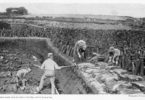Often, one of the first places people start looking when they begin their genealogy research is into their surnames. There seems to be a natural desire among beginning genealogists to discover more about their surnames, including their origins, and how many other people in the world share it. There is a common belief that those who share the same surname must surely also share a common ancestor somewhere. Of course, in reality, this is not always the case, especially with very common surnames. Plus, if you are only studying your surname, you are missing out on a lot of the rest of your family history. Your surname line is only one small part of it, and focusing solely on it cuts out your mother’s side of the family entirely, as well as your father’s mother’s side.
Still, there are genealogical benefits to studying surnames, enough that the practice can and should be a part of your genealogical adventure. Just make sure it’s one part and not the only part, so you can have a complete picture of your entire family history.
How to Get Started Studying Your Surname
There are plenty of surname study groups online. In the past, people would join surname study groups by mail, but today, it is done almost entirely online. This allows a surname study group to reach far more people, which is beneficial in getting good results from the study. Just do a Google search online to see if your surname is involved in one or more surname studies, and then join that study. You may have to submit an application indicating why you want to join, but if you can show that you or someone in your immediate family has that surname, you will probably be accepted.
How Did Surname Study Groups Work in the Past?
Surname study groups work a little bit differently now than they did in the past. When groups were conducted by mail and were first being formed online, people of the same surname (or those with that surname in their immediate family history, such as their mother’s maiden name) would join together in these groups, share genealogical information from their family trees, and determine if any of them shared ancestors. Those who did would work to determine the earliest common ancestor they all shared. Those who did not share a common ancestor with others in the group would use this information to determine if their lineage was correct.
They may have had a non-paternity event in their family history (aka an out-of-wedlock birth where the supposed father wasn’t the biological father), they may have been adopted and not known it, or their particular family was not related to the others in the surname group (especially in the case of very common surnames). These groups were and are very useful for proving if you are indeed related to the line you thought you were related to, and in proving and disproving family legends.
How Do Most Surname Study Groups Work Today?
Today, surname groups work a little bit differently. The availability of inexpensive DNA tests has made it possible for practically anyone to test. In cases where someone can’t afford a DNA test, there are often people in the surname group who are willing to sponsor a test for one or more additional participants. People in surname study groups tend to be generous in this regard, because they want everyone to participate who can, as this leads to more accurate results and greater insights for everyone.
DNA testing is the basis of most surname study groups these days (though there may be a few exceptions). If your DNA results (or that of a relative you got tested on your behalf) match up closely to one or more people in the surname study group, you still get the same family history information you would have gotten from simply sharing genealogical information in the past. If they don’t match with anyone in the study, you can determine if you are really related to this line, or just from a branch of the family that is distant and hasn’t been tested yet.
With DNA, you can now be sure the results are accurate and not based on hearsay or rumor (or the belief you are biologically related to someone…some non-paternity events that were family secrets have been revealed by DNA testing). Another difference with DNA is that you get these results much more quickly than by comparing written research with other members.
Of course, you can still exchange genealogical research with members of a surname study. In fact, you will almost certainly want to if you discover you are an exact or partial match to one or more members of the group. Exchanging genealogical research information with each other can help all of you fill in the gaps on the details of your ancestors’ lives in your family trees. You may even discover other members who have photos of common ancestors they are willing to share, which is always a genealogical victory.
Joining a surname study group can be an important part of your genealogical research You should definitely explore it, especially the DNA component. It can open so many doors to new research and discoveries. Just make sure it isn’t the only thing you focus on in your genealogy. Look at your full family tree, so you can get the complete picture of the people who came together over the centuries to produce you.
- Post Your Hard to Find Surnames
- What’s the Deal With DNA? Using DNA to Trace Your Family History
- Family Tree Lookups






